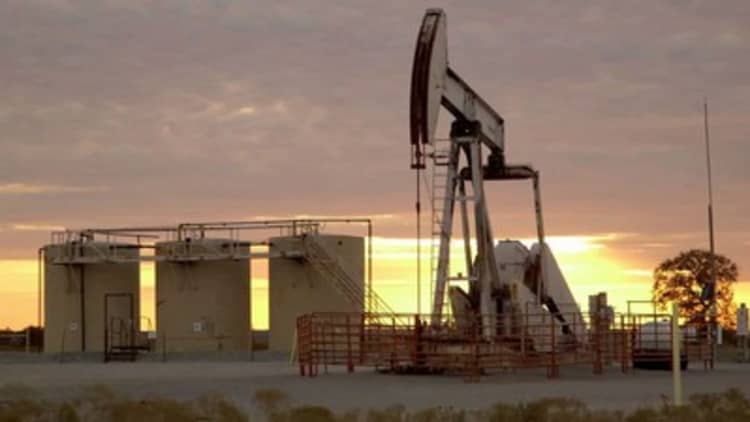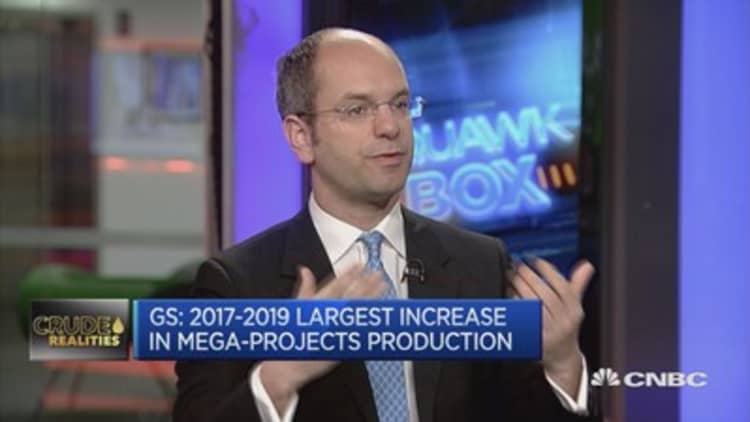
When they meet in Kuwait Sunday, a handful of OPEC and other oil producers are expected to put a happy face on their production agreement, and they should point to the potential for extending the deal in May.
That should help support oil prices, after the recent 10 percent plunge since investors began to doubt the deal earlier this month. The international benchmark Brent crude temporarily fell below the psychological $50 level this week.
Representatives of the five monitoring countries this weekend are expected to review where producers stand on compliance with the six-month agreement to remove 1.8 million barrels a day from the market. As president of OPEC, Saudi Energy Minister Khalid Al-Falih is expected to attend, along with representatives from the five members of the monitoring committee — Kuwait, Algeria, Venezuela, and non-OPEC nations Russia and Oman.
"Without the production cut agreement, I think you could basically target the low-to-mid $30s. I'm of the mind they extend it," said Gene McGillian, manager market research at Tradition Energy. "The Saudis need the revenues from higher oil prices. They know that prices at $30 to $35 is trouble for them."

The December deal between the cartel and major producers, like Russia, helped stabilize prices in the $50s for weeks. As the agreement took hold in early January, Brent traded to a high of just over $58 per barrel, and West Texas Intermediate crude was at about $55 per barrel. Confidence in the agreement drove a throng of buyers into the market, resulting in a record amount of investors in U.S. crude futures betting oil prices would go higher.
But by early March, U.S. producers, lured by steadier prices, continued to increase their own production, bringing it within a half million barrels a day of its previous high. That glut weighed on sentiment, and doubts about the producer agreement arose when the Saudi energy minister reiterated that the kingdom would not shoulder the brunt of the cuts if other producers did not meet their commitments. Al-Falih's remarks were made at the CERAWeek energy conference in Houston, and at the same meeting, Iraq's oil minister revealed that his country was moving toward 5 million barrels of production by mid-year, representing an increase.
Despite the fact, Saudi Arabia, Russia and the other producers made an effort to show a unified front at the CERAWeek meeting, oil continued to weaken.
"The Saudis certainly sent a very strong message that they were not going to do this alone, and they were not going to be the swing producer and make room for other exporters. It was kind of a reiteration of what has been the Saudi position. They'll play a stabilizing role but they'll not play a swing-producing role," said Daniel Yergin, vice chairman of IHS Markit, sponsor of the CERAWeek conference earlier this month.
Do they really want to flirt with the $30s? Is that something that's going to enhance their ability to lead in one of these petrostates?Helima Croftglobal head of commodity strategy, RBC
As for this weekend's meeting, "I expect them to come out with a reaffirmation and point to the high degree of compliance," Yergin said.
Analysts say in OPEC's favor is the fact that the compliance by OPEC members and others now appears to be much better than expected. The cartel is not exhibiting some of the blatant overproduction of the past.
"In sharp contrast to previous agreements, the degree of compliance now is very high, and that may not be so well recognized in the market. It was obviously what drove up the price" earlier in the year, said Yergin. "The shift in sentiment was quite stark, and it was to do with confidence, not the agreement, and the focus on inventories. It was also due to the new bullishness in U.S. shale."
Helima Croft, global head of commodity strategy at RBC, agreed that compliance appears to be strong, after concerns about countries like Iraq, and even Russia not being fully engaged yet. According to Reuters, Saudi Arabia intends to keep supply in line with its quota at about 10 million barrels a day, regardless of what happens with production.
"It's not like there are egregious cheaters in the first place," said Croft. "The breakdown of who is doing what is a bit fuzzy, but some are doing more. Some are doing less." She said if there was a spoiler in the group, it could end up being Iraq.
"I think Iraq will be a subject of discussions, and whether there's any flexibility for Iraq. Can you really hold them to 210,000 barrels (cut)?" Croft said. But she expects at the end of the day, the compliance monitoring group will be supportive of the deal and there will be an extension at OPEC's May meeting. Kuwait has already indicated it wants an extension.
"We went from having these very heated debates over whether OPEC would cheat and could they hold it together, to: 'Look what OPEC's done so far. It looks pretty good,'" she said.

Croft said she thinks a global supply rebalancing is underway, despite the fact that U.S. inventories have continued to rise. U.S. oil supplies rose to a record 533.1 million barrels last week last week, as a jump in imports from the Middle East helped boost inventories. The U.S. produced 9.1 million barrels a day.
"Everyone is focused on the U.S. … If you look outside the U.S., you look at places like Japan. We're seeing the rebalancing. The U.S. is going to be the last," she said.
Croft said she thinks leaders of producing nations will be motivated to agree to an extension of the production cuts because of their own domestic concerns. "Do they really want to flirt with the $30s? Is that something that's going to enhance their ability to lead in one of these petrostates?"
She expects OPEC General Secretary Mohammad Sanusi Barkindo to stress the harmony and cooperation among producers, after this weekend's meeting. "Barkindo is clearly aware of where the market is right now, and any appearances of cracks that appear in OPEC will have an effect on sentiment. He's very aware of that. I think he's going to want to generate the most positive headlines coming out of that meeting," she said.
Some analysts are lowering price expectations due to high supplies. JPMorgan Thursday reduced its price forecast for the second half, taking its 2017 target to $55.75 per barrel for Brent from an earlier forecast of $58.75. It lowered Brent for 2018 to $55.60 per barrel, from $60 per barrel.
Yergin said the drop in oil prices could influence oil producers. "This is certainly going to lead to second thoughts about drilling programs for the second half of the year," he said.
Update: Corrects name of Tradition analyst Gene McGillian


